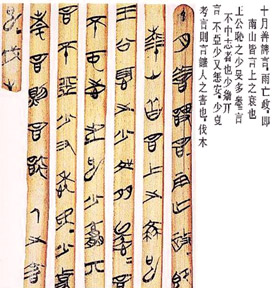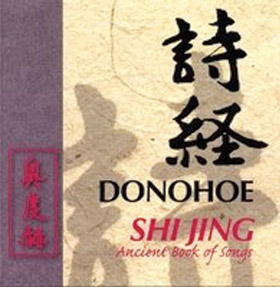Shijing - the origin of Chinese poetry
Mingxin Li (Henan Polytechnic University,
China, CRI Confucius Center at Lubmini College Sri Lanka )
The earliest Chinese poetry begins with Shijing, a collection of 305
poems of varying length, drawn from all ranks of Chinese society. The
title 'Shijing' is usually translated in English as The Book of Songs or
sometimes as The Odes. Shi means 'song-words.' Jing can mean 'classic'.
In the context of literature, it means 'writings' or 'scripture.'
 Some of these poems may date back to 1000 B.C. The oldest poem in
this collection that can be pinpointed precisely dates back to 621 B.C.
most of them during the Zhou period around 600 B.C. This treasury of
traditional songs is the origin of Chinese poetry, the oldest collection
of poems in world literature, and it became one of the Five Confucian
Classics. Some of these poems may date back to 1000 B.C. The oldest poem in
this collection that can be pinpointed precisely dates back to 621 B.C.
most of them during the Zhou period around 600 B.C. This treasury of
traditional songs is the origin of Chinese poetry, the oldest collection
of poems in world literature, and it became one of the Five Confucian
Classics.
Poems classified
In China 'poetic education' in the original meaning is learning
Shijing. Each poem in The Book of Songs was set to music and could be
sung. The compilers classified the 305 poems into folk songs, ceremonial
songs, and sacrificial songs, according to their contents and the style
of the music.
Folk songs, which were popular among the people, made up the best
part of The Book of Songs, while ceremonial songs and sacrificial songs
were used mainly on sacrificial or ceremonial occasions to eulogize the
merits and virtues of the Son of Heaven and of his forefathers.
In spite of the many centuries that the Shijing embraces, there are
several traits prevalent in the poems that later became traits of
Chinese poetry generally. It set ground on the classical Chinese poetry
with its unique style and charm.
Firstly, subject in the poem are commonplace. Different from Western
culture, which was influenced by Shakespeare, Milton, and the Romantic
poets, had a pronounced tendency to think of poems as ornate, elaborate
creations made by a few men of genius. Shijing, had a tendency to think
of poems as something commonplace written by common people.
Secondly, usually the poem deals with either agrarian imagery,
courtship and marriage, or dynastic concerns. The Zhou dynasty was
agrarian in its roots, and for its people, their life is closely related
to the cycles and abundance of the agricultural year.
Likewise, the poems often revolve around the sorrows and joys of
soil, or dealt with the heroic and legendary exploits of rulers and
kings. Other poems, which probably originated in folk-songs, deal with
the everyday trials and tribulations of love, life, and the family.
Original Chinese
Thirdly, each poem is usually composed of lines of four syllables,
usually with rhymed endings in the original Chinese. Often these four
syllables appear as four pictograms. Only a single non-fragmentary poem
consists of a single quatrain, the form that later became popular in
modern Chinese poetry.
Fourth, The poetic principle organizing the poem is often one of
contrast. Often Chinese poetry will juxtapose a natural scene with a
social or personal situation. The reader of the poem sees the similarity
in the natural description and the human condition, and comes to a new
awareness of each by this contrast. In Chinese, this idea is embodied in
the terms fu, bi, and xing. Fu refers to a straightforward narrative
with a beginning, middle, and conclusion, that stands by itself. Bi,
literally means 'against', implies a comparison or contrast, placing two
things side by side. When one takes two different fu, and places them
together, the two create a bi. This results in xing, a mental
stimulation or 'lightning' that pervades the mind of the reader,
bringing new insight or awareness into the nature of the individual fu.
Confucius stated that this xing is the purpose of poetry, in which the
point of a poem was to make the mind contemplate its subject deeply.
 The following is the opening poem of Shijing The following is the opening poem of Shijing
Crying the Ospreys
Merrily the ospreys cry
On the islet in the stream
Graceful gentle and bright
is she
A fit mate for gentleman
for him
Long and short is the water plant
Left and right borne by the current
Graceful gentle and bright
Longing for her, Awaken or in his dream
Waiting for her reply
Long he thought, long night awaken
Long and short is the water plant
Left and right to pluck them
Graceful gentle and bright
Wed her is his dream
Merrily paying tune with her
Long and short is the water plant
Left and right to gather them
Graceful gentle and bright
Marry her is his dream
Drums and bells beating
In this poem, the harmonious relationship of a couple can be seen. In
ancient China, harmony is the core of philosophy. Nature and human,
society and individual, male and female, all should be in harmony
according to the natural law. Just like no one is an isolated island,
everyone is associated with others. Family as the smallest unit of
society represents the harmonious relationship between husband and wife.
So the poem is not for entertainment but for moral lessons. In this
poem, metaphors are osprey and water plant. Ospreys in Chinese culture
is a kind of bird loyal to love, when the couple lost one, the other
will keep alone to the rest of its life.
Here, when the boy wants to pay court to his beloved girl, he
compares his love to the loyal osprey, and the water plant was like his
sentiment, so romantic and deep. When he got her love, he will cherish
it forever. It put on the beginning of Shijing to lay stress on the
importance of harmonious family which is the foundation of social
stability and development.
Besides, different kinds of subject are recorded in Shijing. Given
the genuine and diverse nature of the poems collected in this anthology,
in addition to its literary significance, Shijing is a very valuable
document for those who wish to seek insight into Chinese civilization
and beyond.
|



